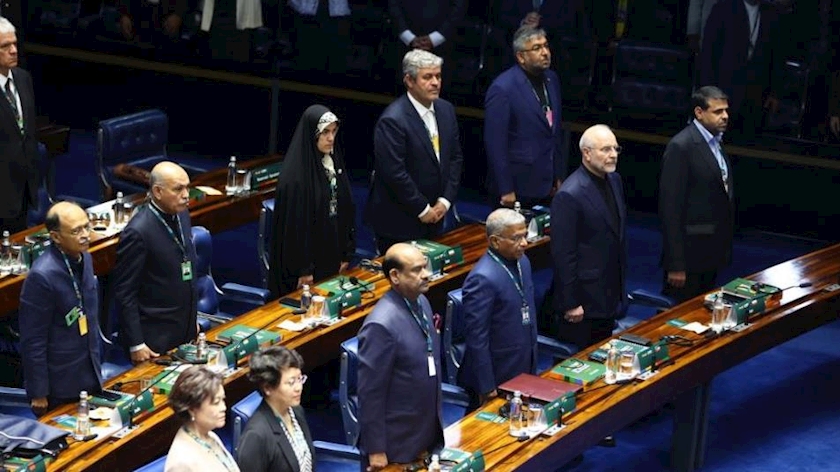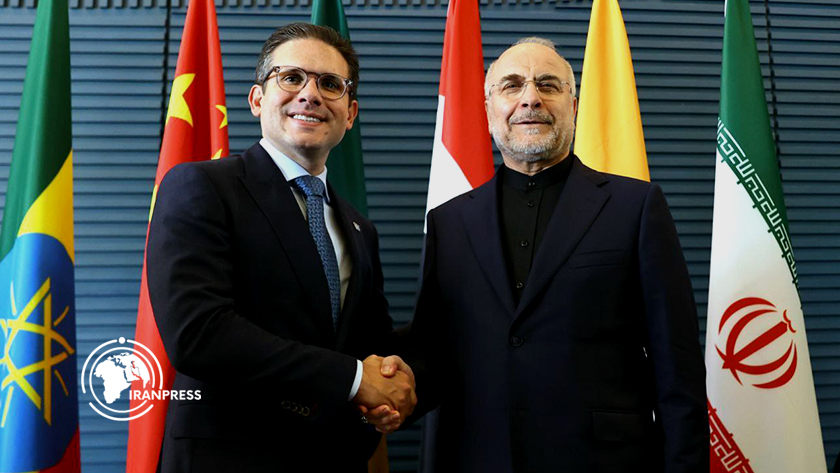Why it matters:
Iran's participation signals its growing diplomatic influence within BRICS, strengthening its ties with member nations on economic, security, and geopolitical matters.
The BRICS is a forum for cooperation among a group of leading emerging economies, including 10 countries: Iran, Brazil, China, Egypt, Ethiopia, India, Indonesia, Russia, South Africa, United Arab Emirates.

The big picture:
The summit, themed "The Role of BRICS Parliaments in Creating More Inclusive and Sustainable Governance," is hosted under BRICS’ rotating presidency for 2025. The meeting gathers parliamentary leaders from BRICS nations to explore strategies for multilateral collaboration.
Hugo Motta, Speaker of the Brazilian Chamber of Deputies, met and held discussions with Mohammad Bagher Ghalibaf, Speaker of the Islamic Consultative Assembly of Iran, on the sidelines of the 11th BRICS Parliamentary Speakers’ Summit.
What the Iranian parliamentarians are saying:
Mohammad Bagher Ghalibaf, Iran’s parliamentary speaker, highlighted Iran’s commitment to fostering economic and political cooperation within BRICS. Ghalibaf: BRICS can safeguard the economic interests of all countries.
"Sanctions pose a growing threat to global economic stability and peace," Iranian parliament speaker Mohammad Bagher Ghalibaf told the BRICS Parliamentary Forum in Brasilia on Thursday.
“Using national currencies, digital assets, and launching joint banking platforms forms an effective front against coercive pressure and sanctions,” he said.
Ghalibaf described sanctions as a “new challenge to the global economy” that directly impacts livelihoods and economic justice.
Salar Velayatmadar Abnoush, head of the Defense Committee at the National Security and Foreign Policy Commission of the Iranian Parliament, underscored Iran’s role in shaping security policies and strengthening defense coordination within the bloc.
Key points:
- Historic participation: This marks Iran’s first official attendance at the BRICS Parliamentary Summit.
- Security discussions: Abnoush’s involvement emphasizes Iran’s growing role in defense and security talks among BRICS nations.
- Economic agreements: Parliamentary leaders signed a cooperation protocol aimed at boosting economic ties and countering unilateralism.
Go deeper:
Iran’s expanding engagement with BRICS reflects its broader foreign policy strategy of deepening alliances beyond traditional diplomatic channels, particularly in global security and economic governance.
Zoom in:
Speaker of the Iranian Parliament, Mohammad Bagher Ghalibaf, after departing Havana, arrived at Brasília. He met with the President of the Chamber of Deputies of Brazil, Hugo Motta, before participating in the 11th BRICS summit.

Ghalibaf kicked off his tour at the head of an Iranian parliamentary delegation on Sunday to visit three Latin American countries, including Venezuela, Cuba, and Brazil.
Upon his arrival at Caracas Airport on Sunday, Ghalibaf was officially welcomed by Venezuelan Foreign Minister Ivan Khel Pinto and other senior officials.
Ghalibaf met with Nicolás Maduro, President of Venezuela, on Monday night in Caracas.
Addressing Tehran-Caracas relations, Ghalibaf emphasized that since Iran and Venezuela share both enemies and allies, strengthening their bilateral ties is more important than ever.
Ghalibaf arrived in Havana on Monday evening and had meetings with senior Cuban officials, including Cuban President Miguel Díaz-Canel.
Brazil is the final step of Ghalibaf's Latin American tour.
Ashkan Salehian

